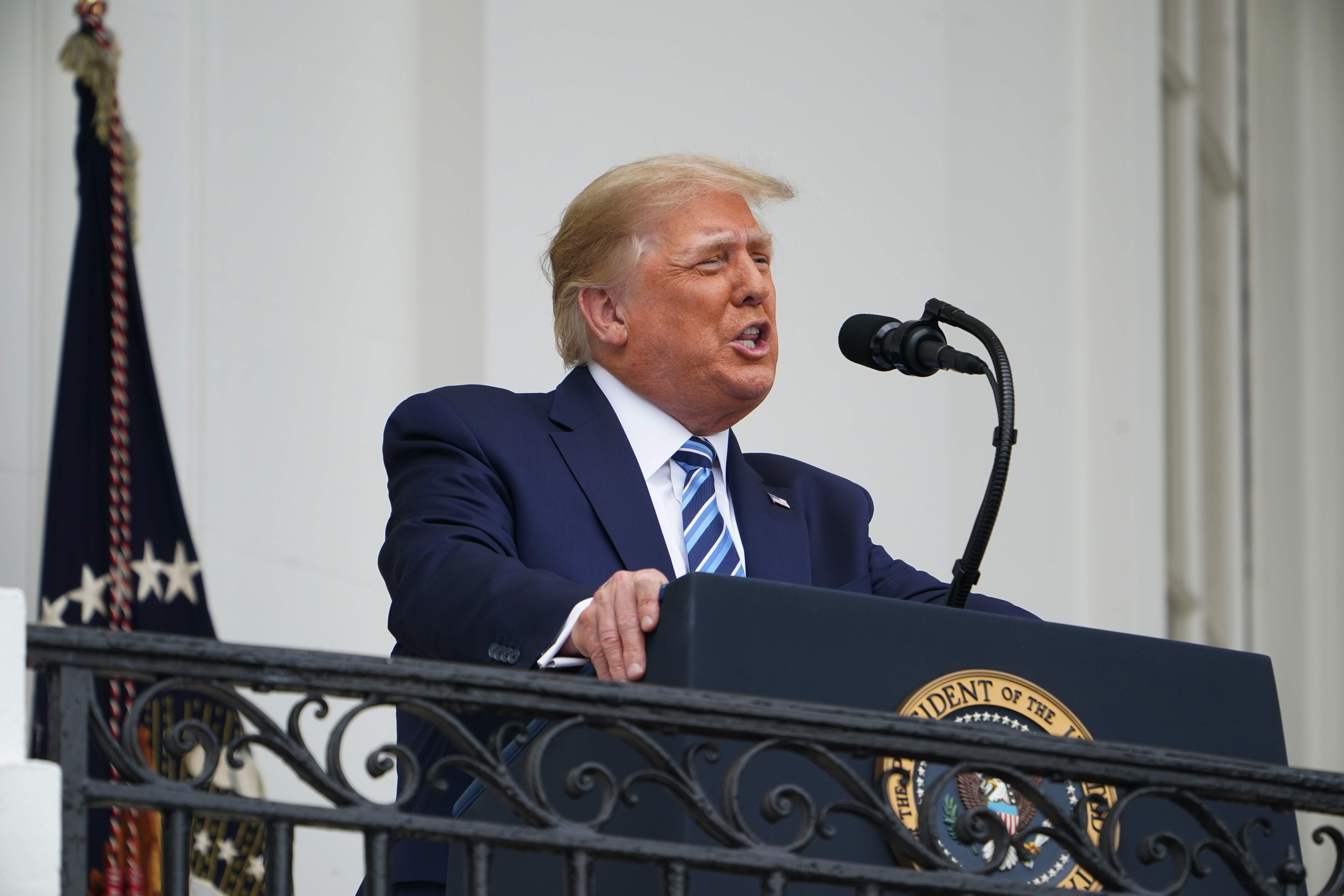Covid recovery, election defeat and Rudy Giuliani’s wild ride
In the penultimate instalment of our series recapping an unprecedented presidency, Joe Sommerlad looks at the president’s swift return from his sickbed for the final weeks of campaigning and his lawyer stumbling from one humiliation to the next


Donald Trump was whisked off to Walter Reed National Military Medical Centre in Bethesda, Maryland, on 2 October 2020 after testing positive for coronavirus, his reluctant, feverish walk across the South Lawn to Marine One proving one of the most dramatic moments of his presidency.
Already given oxygen, he was treated inside the facility with an experimental cocktail of drugs costing more than $1m (£729,000) and which included dexamethasone, a steroid that can induce euphoria, which would explain some of his subsequent tweets.
“I could be one of the diers,” he reportedly reflected, with New York magazine’s Olivia Nuzzi describing his choice of word as “a classic Trumpism, at once sinister and childlike”.
Chief of staff Mark Meadows and social media lacky Dan Scavino pushed out pictures of a tieless Trump, shirt collar open, “at work” behind a conference table on Saturday as conservative media pundits sought to reassure one another that he would emerge stronger and wiser for the ordeal and his physician, Dr Sean Conley, offered optimistic, if inconsistent, accounts of his progress.
That Sunday, Trump ordered the Secret Service to take him for a ride in the presidential limousine so that he could greet well-wishers congregating outside the hospital, risking his bodyguards’ health to play the strongman.
By Monday night, he was back at the White House, standing on the south portico like Eva Peron but looking hellish and breathing heavily as he tore off his face mask and saluted no one in particular.
His advice for his fellow Americans?
“Don’t let it dominate you.”
This was said in a video quickly posted to social media in which he speculated that he might now be immune to the virus (he wasn’t sure but didn’t appear to be aware of the very real phenomenon of reinfection) and overlooked the fact that the elite care he had received was unlikely to be available to most citizens struggling to afford medical insurance.
In the week that followed, White House press secretary Kayleigh McEnany and aide Stephen Miller both tested positive as the disease tore through the West Wing and Mike Pence and Kamala Harris met for the vice presidential debate in Salt Lake City, Utah, a contest best remembered for the Satanic fly that sat perched atop the snow white Pence bonce for a full two minutes.
Croaking away on morning calls to the Fox and Friends breakfast show, the president declined to take part in a virtual debate with Biden but did agree to an alternative town hall event with NBC’s Savannah Guthrie in Florida, complaining about her aggressive questioning before and after as the host took him to task on his wretched pandemic record and for refusing to disavow the far-right Proud Boys at the first debate and by cornering him on his tolerance for the QAnon conspiracy cult.
His reasons would become all-too-clear the following January.
By 12 October, Trump was back out campaigning, against most people’s better judgment, his rallies now in serious danger of being super-spreader events akin to Amy Coney Barrett’s nomination ceremony.
He had clearly learned absolutely nothing whatsoever.
A second encounter with Biden finally took place on 23 October, with the president adopting a less hectoring tone than usual but still failing to score any telling blows against his highly experienced opponent.
He had clearly learned absolutely nothing whatsoever
As the election race entered the home straight and November approached, an attempt by Trump attorney Rudy Giuliani to plant a very iffy story in The New York Post (owner: Rupert Murdoch) about a supposedly incriminating laptop belonging to the Democratic candidate’s son Hunter Biden amounted to little.
Furthermore, it was blocked by both Facebook and Twitter, prompting hypocritical Republicans to cry “censorship!” and call a Senate inquiry.
In another bombshell development, ex-Homeland Security official Miles Taylor revealed himself to be “Anonymous”, the author of a notorious New York Times op-ed published in September 2018 and the accompanying book A Warning, which reassured the public that a resistance effort within the White House was working on their behalf.
Trump had been trying to smoke out the mystery turncoat for two years while his more swivel-eyed supporters insisted “Anonymous” was confirmation that a hostile “deep state” was conspiring against the president.
Election day finally arrived on 3 November but that evening produced an inconclusive outcome, with neither the president nor Joe Biden hitting the magic Electoral College score of 270 as many key states were forced to extend their vote counting deadline to accommodate the predicted influx of postal ballots necessitated by the pandemic.
Months of optimistic polling insisting Biden was way out in front with a double-digit lead and had a shot at turning both Florida and Texas blue came to nothing in what initially at least looked like a nail-bitingly close finish.
Fox News infuriated the Trump camp when it made an early call on Arizona going for Biden, prompting angry denials from senior adviser Jason Miller and the president to personally call Murdoch demanding a retraction.
Already last year’s man in the eyes of the omnipotent media baron, he was told in no uncertain terms precisely where he could shove his objections.
Trump’s next move was to call a press conference at the White House in the early hours of Wednesday morning, entering to “Hail to the Chief” and prematurely (and dangerously) declaring victory, insisting that unspecified fraud was rampant, without providing evidence, and calling on the US Supreme Court to step in.
Already last year’s man in the eyes of omnipotent media baron Rupert Murdoch, Trump was told in no uncertain terms precisely where he could shove his objections
Nevada, Georgia, Pennsylvania and North Carolina had all yet to show their hands at this point but, when they eventually did, all but the last opted for Biden, giving him a 306-232 victory.
That was the same margin by which Trump had beaten Hillary Clinton four years earlier, a result he himself had declared “a landslide” at the time.
Unlike 2016, Biden also won the popular vote, scoring over 81 million ballots – the most ever recorded by an American presidential candidate. Trump picked up 74 million, the second-highest.
Ex-West Wing aide Sam Nunberg had said of the president in October: “What I’m worried about is whether he wants to completely self-destruct and take everything down with him vis-a-vis the election and the Republican Party … This is a guy who’s not gonna lose joyfully.”
How right he was.
Just as he had threatened in advance, Trump refused to accept the election result, once again casting himself as the victim of mass conspiracy, blaming everything from Venezuelan-owned voting machines to state-level meddling and crowdfunding a legal challenge from his enraged supporters to be spearheaded by the aforementioned Giuliani.
“America’s mayor”, so-called for his calm, consoling leadership of New York City in the aftermath of 9/11, was about to become a national embarrassment.
Even before the election, Giuliani had suffered major humiliation when he was entrapped by satirist Sacha Baron Cohen in a sting orchestrated for his latest caper Borat Subsequent Moviefilm, which saw the 76-year-old invited up to the hotel room of actress Maria Bakalova, playing the protagonist’s underage daughter but posing as an OANN reporter.
Bakalova, actually 24, had Giuliani lie on the bed, whereupon the veteran could be seen fishing around inside his trousers before Baron Cohen, as Borat, burst in to expose him.
If anyone could top that, Rudy could.
In the tumultuous weeks that followed, he mistook a Philadelphia garden centre for the Four Seasons luxury hotel and held a conspiratorial press conference in its parking lot anyway, ignoring its situation between a sex shop and a crematorium.
He raved about Jewish financier George Soros with black hair dye trickling from his temples, waxed lyrical about his love of the 1992 Joe Pesci comedy My Cousin Vinny, introduced the world to seemingly-sozzled “witness” Melissa Carone AND caught Covid all in the space of a month in which his team won only one out of more than 60 legal challenges and failed to find any evidence of voter fraud across the 50 states.
“Alas, poor Rudy. I knew him, Horatio, a fellow of infinite jest, of most excellent fancy.”
Bolstered by wacko lawyers Sidney Powell and Lin Wood and Republicans who childishly refused to refer to Biden as “president-elect”, Trump cut an increasingly pathetic figure throughout all this, tweeting out desperate snatches of conspiracy theories and attacking state officials like Georgia’s GOP governor Brian Kemp when they refused to join his botched coup against a free and fair democratic election.
Isn’t it hypocritical of you to accuse others of disinformation when you spread it every day?
Even the likes of attorney general Bill Barr and Senate majority leader Mitch McConnell would eventually tip-toe away from the raging dumpster fire that was his presidency.
Only Kayleigh McEnany, back at the lectern after recovery from her own bout of “China virus”, stood by the president, loyally appearing on Fox night after night waving email print-outs in the air pretending they amounted to “evidence” of skulduggery.
“Isn’t it hypocritical of you to accuse others of disinformation when you spread it every day?” CNN’s Jim Acosta asked her on 15 December, after the Electoral College had certified Biden’s victory, getting no answer.
Yet another defining image of Trump’s failed presidency arrived in the middle of this desperate post-election period as he clung to power “like Mad King George”, as one aide described it to The Washington Post.
Speaking at the White House on 27 November, he once more harangued reporters about the election, pushing the latest unfounded internet smear about his defeat in familiar red-faced and delusional style.
But he did so from behind an unusually small wooden desk, with even the portrait of George Washington looking down over his shoulder appearing to smirk at the absurdity of the spectacle.
More so than the famous meme of him yelling at the young man mowing the White House lawn or the notorious St John’s Church photo-op at the height of the Black Lives Matter protests, the scene captured his four-year tenure at 1600 Pennsylvania Avenue perfectly.
A big man brought low by bad advice and his own worst instincts.
A tyrant draping himself in the grandiose trappings of office and unable to see himself for the laughingstock he truly was.
An emperor without clothes.
Read the full The Trump Review series here





Join our commenting forum
Join thought-provoking conversations, follow other Independent readers and see their replies
Comments